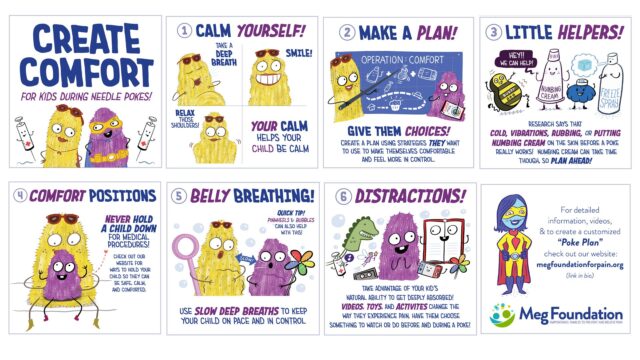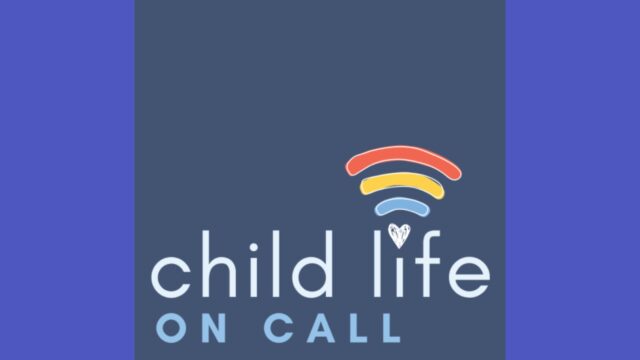What is a Child Life Specialist and How Do They Help Your Family?
What is a child life specialist? So glad you asked! It’s a question that everyone interested in improving kids’ medical experiences should be asking.
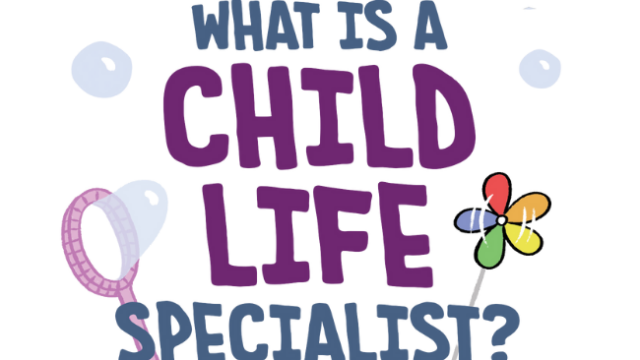
Katie Taylor
Babies & Toddlers (0-2) Kids (3-11) Tweens & Teens (12+) Provider Acute Pain Chronic Pain Procedural Pain English
Share this:
The super simple answer is that child life specialists are professionals who work with children and their families in healthcare settings. But I’m here to give you a much more helpful answer. As a child life specialist (and the CEO of Child Life On Call) who has worked in almost every setting from hospital units to outpatients clinics, I couldn’t be more honored to share more about our profession and how we support kids, families, and the care team.
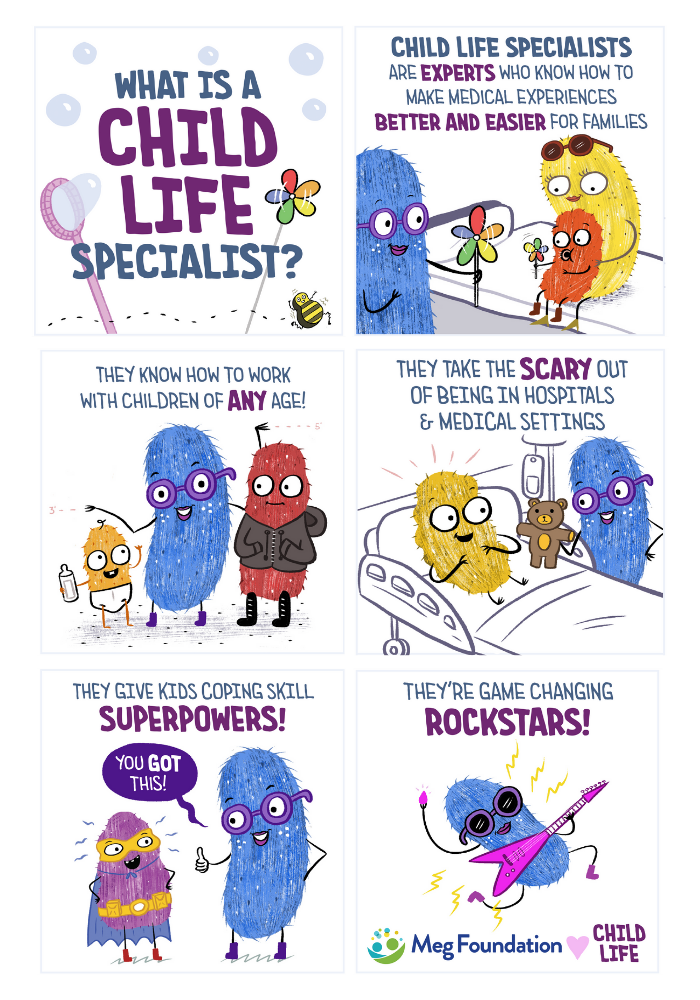
What is a Child Life Specialist and what do we do?
Certified Child Life Specialists (also known as CCLS…which is MUCH easier to type) are experts in child development and how to provide emotional and psychological support to kids and families in healthcare and community settings. They make medical experiences much more positive and reduce the stress and potential trauma of things like getting medical procedures, having surgery, and being in the hospital. How? They use their incredible knowledge to create activities and resources that provide the information and skills kids and parents need in a fun, engaging way. They are excellent at doing things in a way that kids can understand. Child life specialists are a huge benefit for both families and healthcare organizations.
What exactly are the benefits of having a child life specialist on your care team?
Having a child life specialist on your care team can help in so many ways. We reduce anxiety by preparing kids and families with the information and skills they need to cope with medical procedures. We explain what is going to happen, why it is going to happen, and teach strategies for making the process as comfortable and easy as possible.
While we often provide in-the-moment support during those procedures, we also coach parents and other caregivers on what they can do to get kids through as calmly and comfortably as possible. Often, this prep involves what we call medical play, which is helping kids understand and practice what is going to happen using things like dolls, stuffed animals, and other toys.
Through play, child life specialists begin to speak the language of the child and can assess their level of understanding, or misunderstanding, about what is going to happen. Play is non-threatening and universal and serves as a tool for building relationships, sharing information, and providing an opportunity for learning.
Other ways that child life specialists prepare families involves meeting with them before a surgery and giving them a tour, walking them through what their experience will be like. When kids and families are prepared, they feel much less anxious, and the process tends to go MUCH smoother.
Good preparation should do three things:
- Set the stage for positive experience by explaining to the child and the family each step of the process of the procedure. We all do better when we know what to expect.
- Establish trust between the medical team and the family by reducing any unknowns and giving the chance to answer any questions.
- Provide good science based information in a way that the child can understand (taking into account their age and ability).

Comfort Positions: A Guide for Parents and Healthcare Professionals
We also provide emotional support to families and help them cope with everything from an ER visit to long-term illnesses to short hospital stays. A huge goal of child life programs is to transform pediatric healthcare organizations into places where kids and families can feel physically and emotionally safe, comfortable, and heard. We spend a lot of our time when we aren’t with patients helping to educate and train other healthcare professionals to recognize the effects of illness and treatment on children. We want them to understand the many things that can be done to reduce stress and increase comfort for kids.
Why child life specialists are so important
Why is this important? We believe (and research evidence shows!) that giving kids and parents the knowledge, tools, and skills to prepare and support children through medical procedures is a key piece to helping kids have a good health care experience AND improve their healthcare outcomes. It truly is a game changer.
As a child life specialist who has been in the field for over a decade, I have countless stories about how great collaboration between patients, families, health care providers, and a child life specialist can transform a patient’s experience.
Here’s a great example: I was working in the Pediatric Intensive Care Unit of my local children’s hospital with a family who had been there for more than a week. My patient, a 14-year-old boy, was diagnosed with a serious viral infection that caused him to need critical care and support for several days.
As he began to require less support for breathing and was on less medication, his personality began to come through. Although his ability to talk wasn’t as strong as his normal baseline, I remember he creatively used his eyebrows to share with the team how he was feeling.
By partnering with his parents, who know him best, and building on his desire to communicate with us, we came up with a plan for eyebrow movements. Up eyebrows meant ‘yes’ and down eyebrows meant ‘no.’
Through this small, but impactful, movement he was able to tell us what his choices were for a long radiology scan the next day.
- Did he want to know what the room looked like before he got there?
Eyebrows up, yes. - Did he want to bring his comfortable blanket with him?
Eyebrows up, yes. - Did he want to choose a movie to watch while it happened?
Eyebrows up, yes. - Did he want both parents to come with him?
Eyebrows down, no. Turns out he wanted mom to get some rest.
Every situation is as unique as every family is, so talking through any questions or concerns with the care team ahead of time can go a long way in helping establish a sense of trust and support. When it’s done well, kids and families get to enjoy greater peace of mind and more confidence as they face the challenges ahead of them.
How do you find a child life specialist?
Wondering where you can start finding the right Child Life Specialist for your family? Local hospitals are always a great way to start, as they often have their own programs. You can always call and ask. Don’t assume they don’t have a program if you haven’t heard of it before: unfortunately it is common that medical providers might not offer until you ask. If you even find yourself in an ER with your child, definitely ask if they have a Child Life Specialist available!

Child Life on Call: Pediatric Pain with the Meg Foundation
Even if your local hospital doesn’t have a Child Life team, there are virtual services available from providers like Child Life On Call, who can meet with your family virtually. We also work with hospitals and organizations to get families more access to child life services.
Another option? Our national association, the Association of Child Life Professionals is a great place to start to find services near you through this directory.
You may not have heard of us before, but you’ll be really glad you have now
Kids and families deserve every ounce of support when it comes to navigating the challenges of the health care system. We love being a big part of that. Families have expressed their gratitude to me time and time again.
Before meeting a child life specialist, we often hear that they had no idea such a profession existed, but after having benefited from what we can do, they never want to experience healthcare without us around. We become essential parts of their medical journey by being there to support them while they make their way through difficult times. This is without a doubt the best part of our job!
You May Also Be Interested In
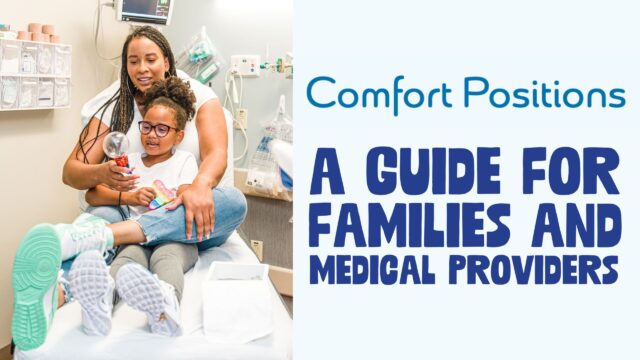
Downloads
Comfort Positions: A Guide for Parents and Healthcare Professionals
This guide shows you how to keep kids safe, and help them feel supported, during medical procedures.
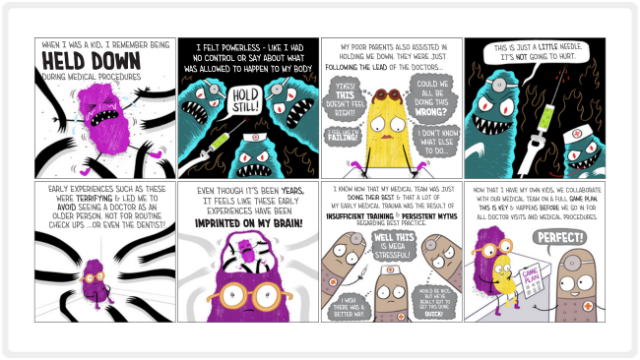
Blog Post
Can holding children down for shots traumatize them? A health psychologist says yes.
I’m a health psychologist and expert in medical illness, trauma, and pain, with 25 years of experience. If I could wipe out any practice that happens on the daily in medicine, VERY high on my list is holding down kids for medical procedures. While science and best practice guidelines from top medical organizations clearly say holding down kids is a terrible idea, it still happens every single day.
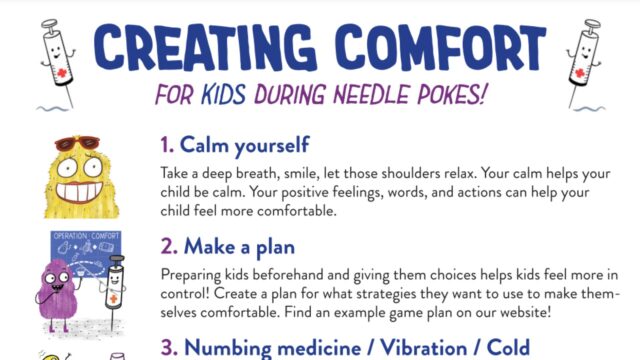
Downloads
Creating Comfort for Kids Quick Guide
Great overview of the best pain management strategies for helping kids get through shots and other needle procedures feeling calm, comfortable, and in control.

About the Author
Katie Taylor is the co-founder and CEO of Child Life On Call, a digital platform designed to provide parents, kids, and the care team with access to child life services tools and resources. She is a certified child life specialist with over 12 years of experience working in various pediatric healthcare settings. Katie is the author of the children’s book, and has presented on the topics of child life and entrepreneurship, psychosocial care in the hospital, and supporting caregivers in the NICU setting both nationally and internationally. She is also the creator and host of the Child Life On Call Podcast which focuses on the essential role of child life services to empower caregivers at and beyond the bedside. You can follow along with Katie and Child Life On Call on LinkedIn, Instagram or Facebook.
